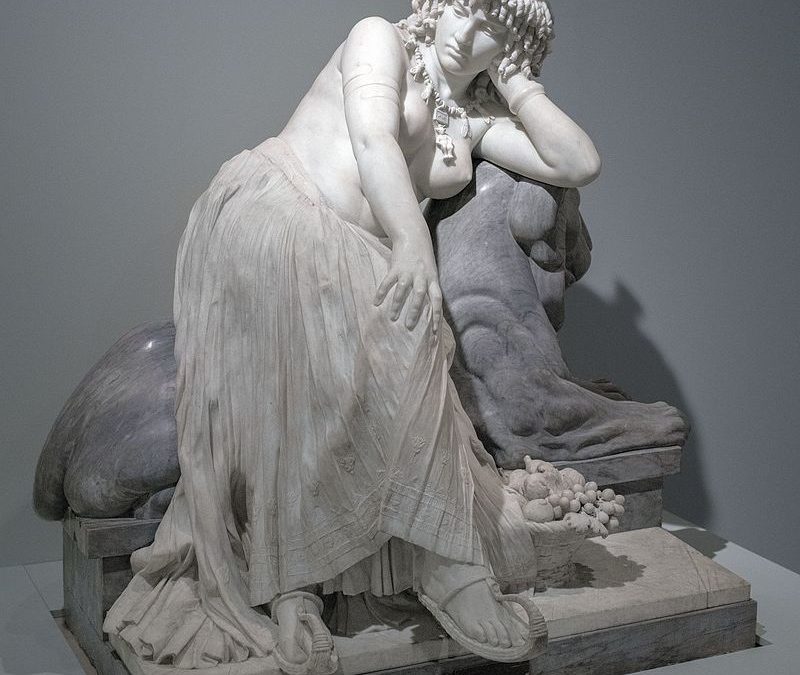Cleopatra: she was a taker…
Book review:
Cleopatra: A Life
by Stacy Schiff
New York: Little, Brown and Company, 2010
Schiff is a Pulitzer Prize winner
Cleopatra: A Life is a compelling, stunningly contextual biography. It makes sense of the canonical, jumbled, and inconsistent biographical accounts of ancient writers who didn’t know Cleopatra personally. In many ways, it’s more modern than ancient.
Cleopatra, apparently, was the richest person in the known Western world while she reigned as Cleopatra VII, the last Pharaoh of the Ptolemaic dynasty, and the last queen of Egypt.
As a ruler, she had her ups and downs, but during her ups, she was the most powerful ruler in that world.
Cleopatra was a goddess, a celebrity, a winning general, a political mastermind, a serial murderess, an utterly enchanting lover, a startlingly well-educated, knowledgeable, and curious mover and shaker…think of Isis, Madonna, Patton, Golda Meir, Lucrezia Borgia, Marie Curie, and Aphrodite combined in a Type A personality with more or less unlimited worldly power…
The political action in Cleopatra: A Life is, sad to say, is all too familiar….I want to emphasize the context that Schiff describes: entirely recognizable governmental and organizational failures/corruption were pervasive in Cleopatra’s Egypt, and they are easily described and understood in modern terms.
Venal bureaucrats “walked like an Egyptian” …
you wouldn’t have had to search too long or too hard in Alexandria circa 50 BC to find one. You say “no surprise”? Well, of course, no surprise.
The Egyptian empire governed by Cleopatra was notoriously and vastly bureaucratized, and possibly the most significant enabling factor was the rich productivity of the Nile delta, renewed (almost) annually by the life-giving flood of the Nile. At the time, this stupefying agricultural abundance fed not only Egypt but also Rome—this was one factor motivating the famous attentions of Caesar and Marc Antony to the affairs in Egypt, including Cleopatra.
The riches of Egypt created an almost failsafe environment for heedless waste and mismanagement without fatal consequences—and also corruption at a level that everyone with any say in the matter could easily tolerate. Cleopatra, and her siblings and forebears, in the Ptolemaic dynasty were divinely in charge, with no effective restraint except the occasional Roman legion or two, and Rome was easily bought off. There was more than enough booty to go around for all who could claim a share.
At the time, there were persistent royal proclamations urging the ideal “good official” to be “vigilant, upright, a beacon of goodwill.” These were perhaps well-intentioned but wholly ineffective. There was too much booty to be had and insufficient penalties for taking more than one’s decent share. And the people of Cleopatra’s Egypt? These were descendants of the people who perhaps willingly labored to build the pyramids, these were people who thought Cleopatra was a goddess, these were people who believed in the everlasting rectitude of the dynastic and religious hierarchies that manifestly benefited a tiny elite…why did the people embrace all of that?
Cleopatra: A Life is a good read…you might have to remind yourself from time to time that none of it was written by Gordon Gekko.
Click here for Gekko’s “greed is good” speech
* * * * * *
Book review. Copyright © Richard Carl Subber 2018 All rights reserved.
Book review: The House by the Sea
May Sarton’s travels, in her mind…
–
Seeing far: Selected poems with 47 free verse and haiku poems,
and the rest of my poetry books are for sale on Amazon (paperback and Kindle)
and free in Kindle Unlimited, search Amazon for “Richard Carl Subber”
* * * * * *
© 2018 – 2024, Richard Subber. All rights reserved.
